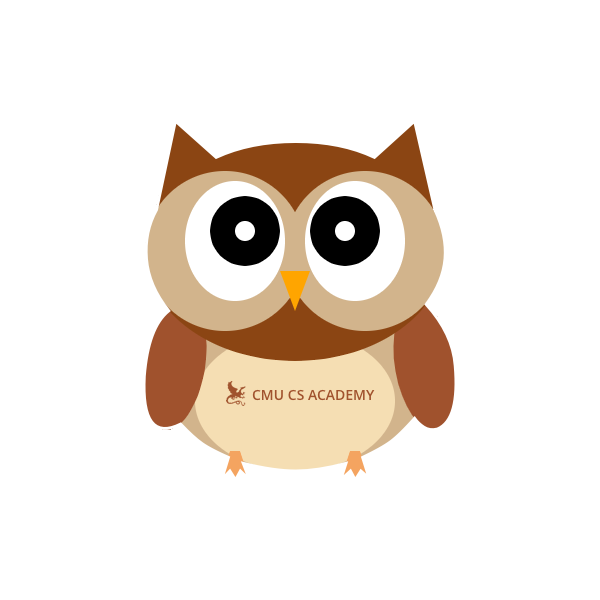CS Academy Provides Free Coding Curriculum, Aiding Transition to Online Learning
Virginia Alvino YoungMonday, March 30, 2020Print this page.

"Remote learning takes more energy than I expected," said Daryl Detrick, who teaches high schoolers how to code in New Jersey, and, like thousands of his peers, is working from home due to the novel coronavirus. But CMU CS Academy is easing his transition to the virtual classroom. CS Academy is a free, online, interactive computer science curriculum that includes teacher training and online technical support.
Detrick enrolled in the program earlier this year. He wanted to introduce the programming language Python into his coding classes, but "was having trouble finding time to develop a curriculum from scratch and couldn't find an existing curriculum I was comfortable with," he said. He noted a further challenge is that many coding teachers don't have a background in computer science.
Program Manager Erin Cawley said CS Academy has recently seen a spike in use.
"Typically, we would see about 50 new teachers a week sign up for the course," she said. "In the past week we've seen nearly 300." That brings the total number of active daily teachers to about 750, serving more than 10,000 students.
To help educators get up to speed, CS Academy has begun offering daily webinars. Morning sessions serve as an overview of the program and how to get started. "One of the biggest hurdles to transitioning from textbooks to remote learning is getting familiar with a new tool," Cawley said.
Afternoon webinars provide an in-depth look at each course CS Academy offers. CS1 is a yearlong high school course used by educators that includes 120 hours of instruction and introduces Python programming through graphics and animation. CS0 is a light version intended for middle schoolers, as an extracurricular program or for home schoolers.
Cawley said additional supports have also been added to the teacher portal to make remote life easier. These resources provide more granular data, help track student progress, and make it simpler to see the amount of time spent on work and to view recently completed tasks.
"It's nice to be able to help out in a time of need," said Cawley, who's been fielding kind feedback from CS Academy teachers, including Detrick.
"At first it took a little adjustment, as it was a different way of teaching," Detrick said, "but the students could do much of the learning on their own, with my role being to support and encourage them, while filling in gaps as needed. The students really enjoy the creativity that CS Academy allows them and it's great for students of all levels." Detrick's students were already familiar with working on the program at home, which has assisted in the transition to online-only classes.
"Remote learning is hard!" said Mark Sidarous, who teaches STEM to students from pre-K to eighth grade in Chicago. He's used both CS0 and CS1 since last fall, and said that it can be difficult to get everything up and running in a virtual classroom without advance notice. "CS Academy has been a real boon in this area. It works on any computer because it's cloud-based. I wouldn't be able to do this if I was trying to coach seventh graders on how to install and set up GIT and FTP, for example. We've been trying to get Chromebooks to students, and I'm pleased to say it works great on them. It's not ideal, but it even works on mobile devices. I have a few students plonking away on a parent's Android phone."
Sidarous is recording instructional videos of himself to supplement the program. "In my mind, the tools and supports that are built into CS Academy make it an ideal platform for remote learning, when supplemented with direct instruction and lots of virtual support. I've even had students do screen sharing to coach them through a particularly difficult coding exercise," he said.
CS Academy cofounder and Associate Teaching Professor David Kosbie said despite these uncertain times, the program remains committed to its mission of helping to bridge gaps and ensuring that every high school student in the world has access to a world-class computer science education. "We are also fully committed to remaining entirely free — free content, free training, free support, everything completely free — so as to reach even the most disadvantaged students," he said.
CMU undergraduate students provide ongoing support to the teachers using CS Academy materials. They continue to work remotely, assisting teachers, building other curricula and translating the entire program into Spanish, which will launch next year.
Cawley said the team has the capacity to maintain more growth. "We just want people to know that we're here for them," she said.
As for Detrick, he encourages others to follow his lead. "Any dedicated teacher who is willing to try something new can teach a quality CS class using CS Academy," he said.
Byron Spice | 412-268-9068 | bspice@cs.cmu.edu<br>Virginia Alvino Young | 412-268-8356 | vay@cmu.edu
